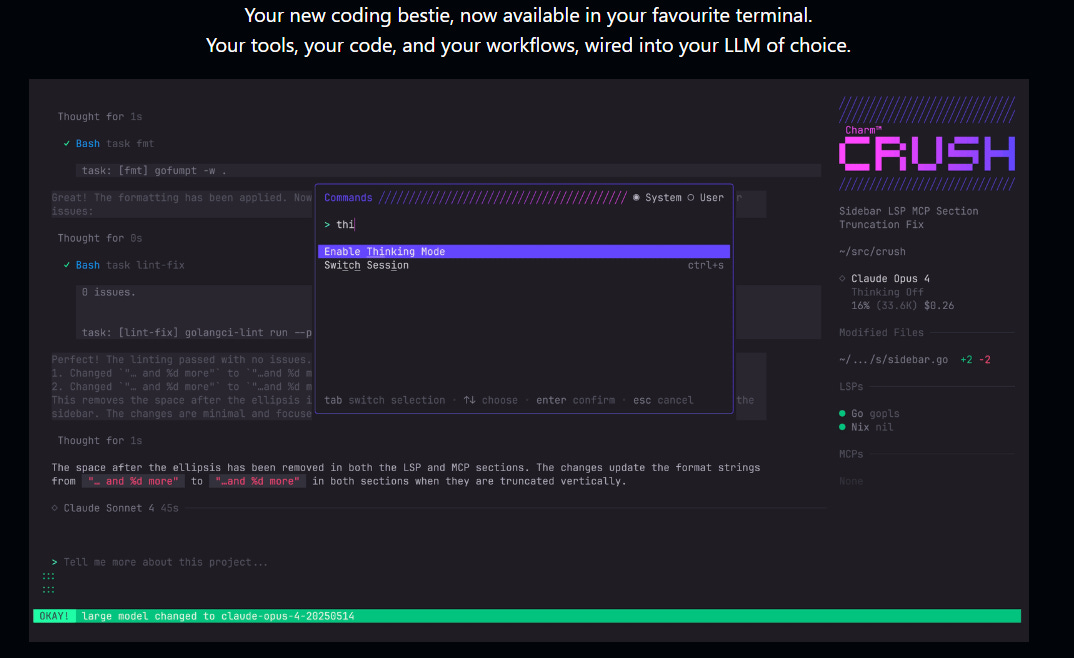[Dev Catch Up # 75] - GPT 5 and GPT OSS, Modern Node.js pattern, All about HTTPS, A Simple Git WorkFlow, From GPT-2 to GPT-OSS, CRUSH Terminal Coding Agent, Genie 3, mcp-go, Sourcebot and much more!
Bringing devs up to speed on the latest dev news from the trends including, a bunch of exciting developments and articles
Welcome to the 75th edition of DevShorts, Dev Catch Up!
For those who joined recently or are reading Dev Catch Up for the first time, I write about developer stories and open source, partly based on my work and experience interacting with people all over the globe.
Thanks for reading Dev Shorts! Subscribe for free to receive new posts and support my work.
Some recent issues from Dev Catch up:
Join 8000+ developers to hear stories from Open source and technology.
Must Read
Last week was OpenAI’s week. GPT-5 landed with stronger reasoning and improved ability to work with integrated tools. They also released open-weight reasoning models gpt-oss-20b and 120b. Check OpenAI’s GPT-5 post for details on the new model. Also, see the GPT-OSS post for information on the open-source models.
We all know HTTP and HTTPS. The real difference between them is security. When HTTP runs over an extra protocol to keep information safe, it becomes HTTPS, and that extra protocol is TLS. Read this Substack post that explains how HTTPS works, including why TLS is needed and how the handshake secures data.
Google has released Genie 3, the general-purpose model. It turns prompts into interactive 3D visuals. It uses advanced world modeling to build realistic worlds you can control and explore in real time. Check the Google DeepMind post for details.
As systems get bigger, deployments should not cause downtime. Different deployment patterns help with this. These include rolling updates, blue-green, canary, and feature toggles. This post explains how these deployment patterns keep your system running while you update it.
OSS Highlight of the Week
This week we are featuring CRUSH. It's a free, terminal-based coding agent. It links your tools, code, and workflows to the LLM you prefer. It supports many models, session-based context, LSP integration, and extensibility via MCP. It works across macOS, Linux, and Windows (PowerShell and WSL). Check the GitHub repo for more details.
Good to know
Node.js has changed a lot in recent years. This post shows the new, easier ways to write code, use built-in features, and avoid extra libraries. Check this simple guide which can help you work faster with modern Node.js patterns today.
I came across a post about OpenAI’s new open-weight models, gpt-oss-20b and gpt-oss-120b. It shows how they’ve advanced since GPT-2. It also compares them with Qwen, looking at architecture, optimizations, and benchmarks. It's a good read if you want to see how open-weight reasoning models have progressed.
Code reviews are more than finding bugs. They’re a chance to make code stronger and easier to maintain. This guide shows you how to find and fix common problems using the SOLID principles. It includes clear examples. This is a great read to help make your reviews more effective.
MCP Go helps you build Model Context Protocol servers in Go. It takes care of the complex protocols and server management. This lets you focus on building tools. Useful if you want to develop MCP Server in Go with less boilerplate. Check the GitHub repo for more details..
Notable FYIs
If you’re a developer, knowing Git is essential for software development. Learning the basic Git flow helps you understand how to add files to staging, commit them, push to remote, pull or fetch updates. Read this Substack post to learn a simple Git workflow.
When working on someone else’s codebase, we usually spend a lot of time trying to understand it. Sourcebot is a self-hosted tool that enables you to query the codebase in natural language and explore it without difficulty. Check the GitHub repo to see how to set it up and run.
If you are a Python developer, read this post on design patterns. It explains which ones add unnecessary complexity to your code. It's worth checking out the post if you want to keep your Python code clean and simple.
A good RAG pipeline is more than retrieval. It requires careful work before, during, and after retrieval. It includes data indexing and query optimization, hybrid search, re-ranking, and prompt compression. Check this post to learn about these advanced RAG techniques in detail.
I sometimes run Claude Code in YOLO mode which skips permissions, but it is risky because a wrong command could delete system files. Anthropic suggests a safer way by running it in a Docker Dev Container to isolate its actions. Check the video to see how to use YOLO mode safely.
That’s it from us with this edition. We hope you are going away with a ton of new information. Lastly, share this newsletter with your colleagues and pals if you find it valuable. A subscription to the newsletter will be awesome if you are reading it for the first time.


